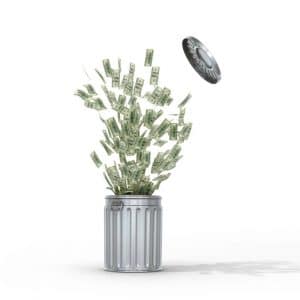
We write about this subject because we are often asked, “What is the next big thing?” Well, one needs only to be aware of the megatrends of our time to identify the business opportunities that are already demonstrating themselves.
China Won’t Take It Any More
In January 2018, China virtually stopped taking American recyclable materials. They complained that the cardboard and certain plastics that they were looking for were mixed with too much trash to make separation and recycling feasible. Mitch Hedlund, of the nonprofit organization Recycle Across America, says, “Recycling has been dysfunctional for a long time. But not many people really noticed when China was our dumping ground.”
Now, without a buyer, recycling costs are skyrocketing, more of it ends up in the landfills, and the pressure is on municipal governments to raise taxes to cover the increased costs and find better solutions. Some cities have actually taken to incinerators. Even though the heat can be used to produce electricity, residents are concerned about air pollution. Incineration is not a long term solution.
No Level Playing Field
More pressure is being applied to the source, the producers of especially CPG products. Up until now, they have not had to pay the cost of disposing of or recycling their own product packaging. Their argument is basically two pronged:
First, they argue that the consumer may say they want sustainable alternatives, but only a small percentage will actually pay for them. We think this is changing especially in the light of the most recent Nielsen reports on the subject. If cities begin to raise taxes to cover the costs of disposing of the increased waste, won’t the consumer be paying more for their products anyway?
Second, they argue that they can’t compete with producers that produce and sell non-sustainable packaging. As much as industry hates more government controls, it appears to be the only thing that will level the playing field. What if it was illegal to use disposable packaging? What if producers were legally required to use returnable, reusable, or biodegradable packaging instead?
Confusion
There is also a debate about what is “sustainable” or “recyclable.” If a recycling waste company simply moves the waste offshore, is it really being recycled? What if the only recycler in town decides to raise their rates significantly? Several cities are already subsidizing recyclers. Also, in the case of most plastics, if the plastic is turned into fibers that are reused for clothing, for instance, what happens to the fibers after their useful life? Does the micro plastic residue become even more of a problem? Now that China will no longer be taking our recyclables, suddenly it’s our problem to dispose of them, reduce them, or find a better use for them.
“One Man’s Trash is Another Man’s Treasure”
This is a problem that’s not going away. In fact, it’s just getting worse. The obvious business opportunity here is to solve this problem.
We often write about entrepreneurs who are addressing these issues and getting ahead of the curve. As Bonnie says, “If you want to change the world, put a buck on it!” In other words, go into business with a solution that’s just plain cheaper than the costs of continuing to pursue an unsustainable course.
TerraCycle is a great example of how to profit from solving part of this problem. They are approaching it from the source. They will be producing a comprehensive, reusable packaging system that will be used by major brands. TerraCycle’s packaging will begin to be seen in the market this year. If your garbage bill was going sky high, wouldn’t you favor purchases that came in non-garbage producing packages?
Synova as another profitable solution. They approach the problem at the other end, at refuse facility. Instead of burial or incineration, they gasify both bio and plastic waste through a proprietary process and use the gas to produce power. The production of power offsets the costs and the waste is eliminated!
Like these pioneers, we hope this article inspires and encourages young entrepreneurs to start businesses that address all aspects of this problem, from packaging materials, to distribution, to collection, to reuse and power production. The latest thing? It’s sitting in your garbage can!
Who We Are

Michael Houlihan and Bonnie Harvey co-authored the New York Times bestselling business book, The Barefoot Spirit: How Hardship, Hustle, and Heart Built America’s #1 Wine Brand. The book has been selected as recommended reading in the CEO Library for CEO Forum, the C-Suite Book Club, and numerous university classes on business and entrepreneurship. It chronicles their humble beginnings from the laundry room of a rented Sonoma County farmhouse to the board room of E&J Gallo, who ultimately acquired their brand and engaged them as brand consultants. Barefoot is now the world’s largest wine brand.
Beginning with virtually no money and no wine industry experience, they employed innovative ideas to overcome obstacles, create new markets and forge strategic alliances. They pioneered Worthy Cause Marketing and performance-based compensation. They built an internationally bestselling brand and received their industry’s “Hot Brand” award for several consecutive years.
They offer their Guiding Principles for Success (GPS) to help entrepreneurs become successful. Their book, The Entrepreneurial Culture: 23 Ways To Engage and Empower Your People, helps corporations maximize the value of their human resources.
Currently they travel the world leading workshops, trainings, & keynoting at business schools, corporations, conferences. They are regular media guests and contributors to international publications and professional journals. They are C-Suite Network Advisors & Contributing Editors. Visit their popular brand building site at www.consumerbrandbuilders.com.
To make inquiries for keynote speaking, trainings or consulting, please contact sales@thebarefootspirit.com.






